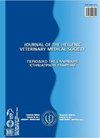Investigation of Acute Phase Proteins in Cattle Infected with Mycobacterium bovis
IF 0.4
4区 农林科学
Q4 VETERINARY SCIENCES
引用次数: 0
Abstract
Tuberculosis (TB) is a contagious and zoonotic disease that adversely affects human and animal health, caused by the formation of tubercules in a caseous character in the lungs, other tissues and organs. The causative of the disease is Mycobacterium bovis. An increase or decrease in acute phase protein (APP) levels is observed in various bacterial, viral and parasitic diseases in cattle. Therefore, in this study, it was aimed to determine the changes in the levels of AFPs in cattle infected with M. bovis. In the study, 26 tuberculosis suspected and 10 healthy cattle blood serums collected from various enterprises in Samsun were used. Rose bengal plate test and complement fixation test were applied in serum by taking blood into heparin containing tubes from vena jugularis of cattle. Whole blood samples were subjected to gamma interferon ELISA test. Haptoglobin (Hp), serum amyloid A (SAA), albumin and total protein (TP) levels, which are among the acute phase proteins, were determined in the blood serums taken from the groups. As a result of the analysis, when the AFP levels of the cattle infected with M. bovis and the cattle in the healthy group were compared, it was determined that haptoglobin (p < 0.01), serum amyloid A (p < 0.01) and total protein (p < 0.01) levels, which are AFPs increased statistically significantly compared to the healthy group, while the albümin (p > 0.05) level decreased, but there was no statistically significant difference. Keywords: acute phase protein (APP); cattle; mycobacterium bovis; tuberculosis (TB),牛分枝杆菌感染牛急性期蛋白的研究
结核病是一种传染性和人畜共患疾病,对人类和动物健康产生不利影响,是由肺、其他组织和器官中形成干酪样结核引起的。这种病的病原体是牛分枝杆菌。在牛的各种细菌、病毒和寄生虫疾病中观察到急性期蛋白(APP)水平的增加或减少。因此,在本研究中,旨在确定牛分枝杆菌感染后牛体内afp水平的变化。本研究使用了从三星市各企业采集的26例疑似结核病牛血清和10例健康牛血清。采用牛颈静脉含肝素管取血,在血清中进行玫瑰孟加拉板试验和补体固定试验。全血标本进行γ干扰素ELISA检测。测定各组血清急性期蛋白中的触珠蛋白(Hp)、血清淀粉样蛋白A (SAA)、白蛋白和总蛋白(TP)水平。分析结果表明,将感染牛支原体牛与健康组牛的甲胎蛋白(AFP)水平进行比较,确定接触珠蛋白(p <0.01),血清淀粉样蛋白A (p <0.01)和总蛋白(p <0.01)水平,与健康组相比,白蛋白蛋白(p >0.05)水平下降,但差异无统计学意义。
关键词:急性期蛋白;牛;牛结核分枝杆菌;结核病,
本文章由计算机程序翻译,如有差异,请以英文原文为准。
求助全文
约1分钟内获得全文
求助全文
来源期刊

Journal of the Hellenic Veterinary Medical Society
VETERINARY SCIENCES-
CiteScore
0.60
自引率
0.00%
发文量
83
审稿时长
>12 weeks
期刊介绍:
The Journal of the Hellenic Veterinary Medical Society (J Hellenic Vet Med Soc) is a quarterly peer-reviewed journal that publishes articles in all aspects of veterinary science and related disciplines. It is published by the Hellenic Veterinary Medical Society and is indexed in the Web of Science and in Scopus.
There are no publication fees in the journal. Authors considering submitting manuscripts for evaluation and publication are requested to read carefully the instructions for authors and fully comply with them.
Non-complying manuscripts may be returned to the corresponding author for formatting.
 求助内容:
求助内容: 应助结果提醒方式:
应助结果提醒方式:


